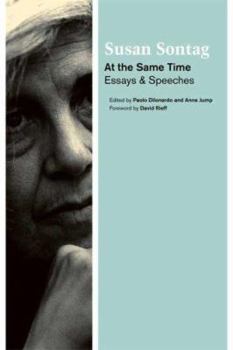At the Same Time: Essays and Speeches
Select Format
Select Condition 
Book Overview
"A writer is someone who pays attention to the world," Susan Sontag said in her 2003 acceptance speech for the Peace Prize of the German Book Trade, and no one exemplified this definition more than she. Sontag's incisive intelligence, expressive brilliance, and deep curiosity about art, politics, and the writer's responsibility to bear witness have secured her place as one of the most important thinkers and writers of the twentieth century. At the Same Time gathers sixteen essays and addresses written in the last years of Sontag's life, when her work was being honored on the international stage, that reflect on the personally liberating nature of literature, her deepest commitment, and on political activism and resistance to injustice as an ethical duty. She considers the works of writers from the little-known Soviet novelist Leonid Tsypkin, who struggled and eventually succeeded in publishing his only book days before his death; to the greats, such as Nadine Gordimer, who enlarge our capacity for moral judgment. Sontag also fearlessly addresses the dilemmas of post-9/11 America, from the degradation of our political rhetoric to the appalling torture of prisoners in Abu Ghraib. At the Same Time , which includes a foreword by her son, David Rieff, is a passionate, compelling work from an American writer at the height of her powers, who always saw literature "as a passport to enter a larger life, the zone of freedom."
Format:Hardcover
Language:English
ISBN:0374100721
ISBN13:9780374100728
Release Date:March 2007
Publisher:Farrar Straus Giroux
Length:235 Pages
Weight:0.94 lbs.
Dimensions:0.9" x 5.8" x 8.5"
Customer Reviews
3 ratings
Serious vs Fun
Published by Thriftbooks.com User , 15 years ago
Well, Sontag would never have been given the chaired Professorship of Fun at Cornell or Duke or John Hopkins. American intellectuals have left her behind, along with Gore Vidal and Edmund Wilson. Sontag took literature seriously, in contrast with those who see the enterprise of literary creativity as no better than other forms of expressions such as comic books and pornography. Instead, Sontag hangs with the likes of Theodor Adorno and Walter Benjamin, the serious Germans, of darker times, Nazi times, when the going was good, if you took literature seriously. These essays are not classics; they are occasional pieces, placed together with acceptance speeches and several pieces of journalism written in response to 9/11. In old age, Sontag became insufferably arrogant, a snob's snob, given to calling people stupid, and falling for that absolutely deadly conceit of the New York intellectual, namely, the belief that people living outside Manhattan are backward and ignorant. Sontag seems to have been preoccupied by thoughts of cancer and war for a good twenty years and this makes her unusually grave for an American, perhaps unique among American feminists whose pursuit of status and sexual pleasure distract them from bigger topics. Sontag, ever the European, stayed with her grim task, like the Marxists in New York during the forties who stuck with their studies of Nazi Germany and returned home as fast as they could once the war was over. She's always been more interested in knowing what makes the world tick than in learning how to get off. All of this in the end has resulted in a refined bitterness, a remarkably narrow literary scope, and a great moral passion. Sontag is very good on the subject of "the war on terror." Her writings, however brief, on torture are very sharp. She is nothing less than brilliant on the photographs of torture emerging from the Iraqi prisons, taken by amateur soldier photographers as souvenir snapshots. She is the only writer that I know of who has seen all of this as part of the American culture of sleeze, not an aberration, but as much as part of our daily lives as Jerry Springer and Oprah. Sontag will be missed, but she lives in that very long line of nonacademic intellectuals who never allowed themselves to think that the university is a place of learning.
Great way to get to know her work
Published by Thriftbooks.com User , 16 years ago
I had never read her work. Shame on me. I truly enjoyed it. Saying she was smart and interesting is an understatement.
A Unique Voice
Published by Thriftbooks.com User , 17 years ago
Reading this collection of essays is an exhilarating experience for anyone who cares about the ethical value of literature, as Sontag herself would say, the "seriousness" of literature. For Sontag was nothing if not "serious". This is not to say humorless, but always fully engaged, grappling with issues that she would return to time and again if her views changed or to clarify a point. These issues, exemplified by this sterling collection of essays, range from the political to the moral to the literary (she would probably say the latter encompasses the former two). While her outspokeness frequently won her enemies, and her bluntness can be seen at times as insensitive, she was always looking inward to create a public person that she could admire, a strenuous egotism. Readers of this volume can find her championing writers she feels have been neglected, criticizing the United States foreign policies and most notoriously, evaluating the attacks of 9/11 in yet further clarifications of her opinions. The loss of this woman is incalculable; even when one disagrees with her(and at some points I am sure you will) you will never fail to find her challenging you to define your own point of view. Her aphorisms expand in widening concentric circles of thought, broadening your vistas with clarity and compassion.





